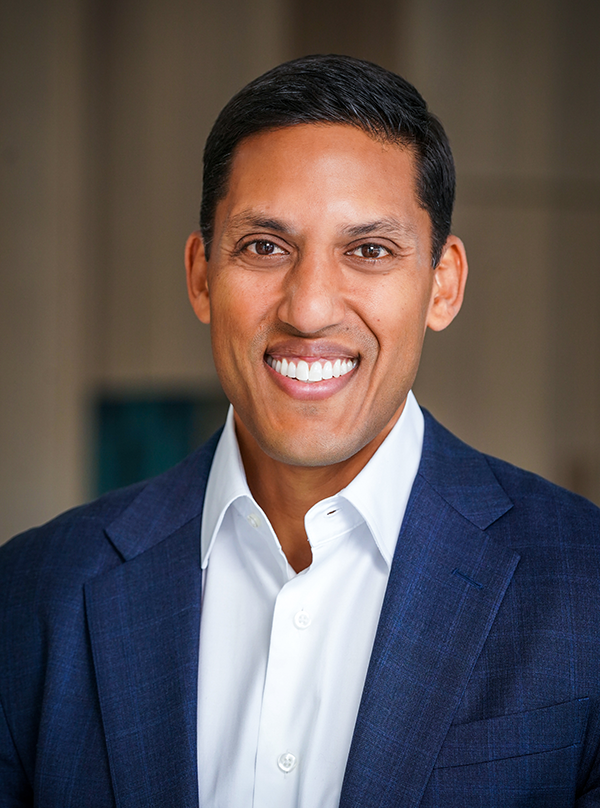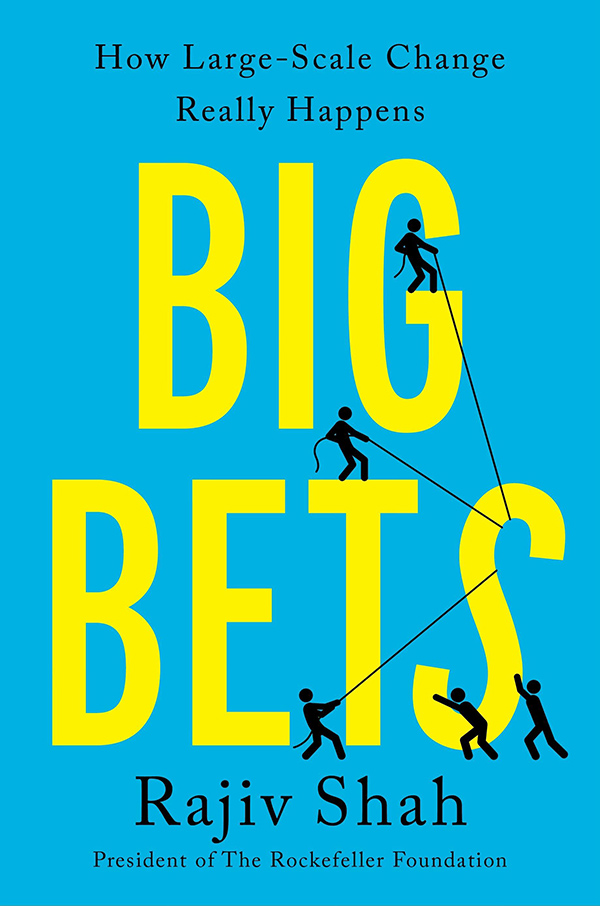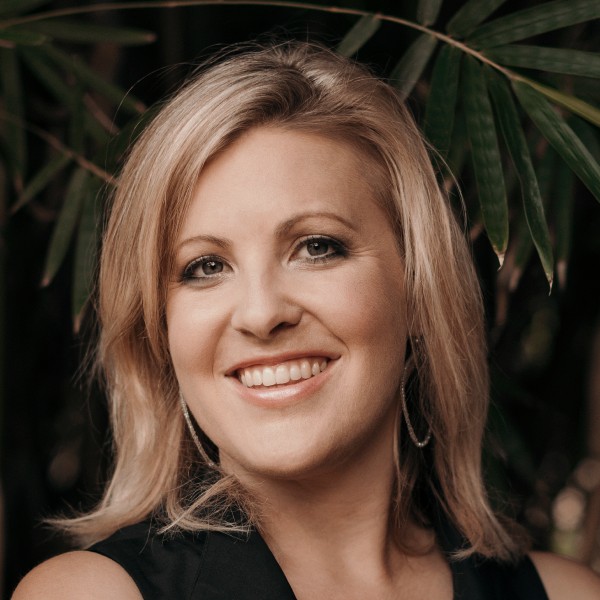Rajiv Shah’s resume is filled with big things. He has worked to help vaccinate nearly a billion children; led responses to the 2010 Haiti earthquake and the Ebola epidemic; expanded COVID testing; and made strides in connecting a billion people around the world to electricity.
“I’ve sat in communities with parents who lost a child to a preventable illness, and I just know in my heart what it means to have been part of something that helps save 16 million lives,” he said.
“I think big bets are possible, and having a ‘big bet’ mindset requires thinking differently about how to solve some of these challenges.”
That scale of change might seem superhuman. But in his new book, “Big Bets: How Large-Scale Change Really Happens,” Shah, the president of the Rockefeller Foundation, writes that making big changes to improve the world isn’t just the work of presidents, saints or billionaires.

He says he’s proof of that. He grew up in a middle-class family in suburban Detroit and was inspired to do something meaningful with his life after watching Nelson Mandela give a speech on television. Although he realized he’d never be Mandela, he did come to adopt what he saw as Mandela’s “big bet” mindset.
When faced with a problem, people who embrace this mindset seek to actually solve the problem, not settle for incremental improvements or charity. By going big — as he has working with teams at the Bill & Melinda Gates Foundation, in the Obama administration and now at the Rockefeller Foundation — it’s possible to improve the lives of people around the globe.
Taking a fresh approach to identifying solutions, locating sometimes-unlikely partners, and collecting and analyzing data are all part of the work, he said.
Shah spoke with Faith & Leadership’s Sally Hicks by Zoom in advance of delivering the Victor J. Dzau Distinguished Lecture in Global Health at Duke University.
Faith & Leadership: How do you define “big bet,” and why do you think it’s important to embrace this mindset?
Rajiv Shah: Instead of thinking about doing good as only charitable kindness, a “big bet” is really saying, “Let’s take one of those challenges and try to actually solve the problem” — figure out who you need around the table to prevent fentanyl deaths in America, who you need around the table to rethink how governments and companies can work together to vaccinate every child on the planet.
I’ve had the opportunity to sit with people who’ve done that. Some have been presidents, like President Obama, some have been famous business and technology leaders, like Bill Gates, but some have been hardworking, deeply committed individuals in a rainforest in south India or in rural villages in West Africa.
Their big bet mindset set them apart and allowed them to make change happen at real scale. And so I wrote this book to tell their stories and share the learnings and hopefully inspire others to do more.
F&L: How do you avoid being overwhelmed if you’re vaccinating all the children in the world or solving hunger? So many people recommend taking a small step to get started and combat feeling overwhelmed. But you’re obviously going the other way.
RS: Well, the importance, the value of going big or making big bets is it does force you to do a different kind of analysis and a different kind of study to ensure that you really know what are the fresh, innovative solutions that, for example, could help reduce child mortality.
The answer to that question on a global basis 20 years ago was current and new vaccines that were not reaching half of the children born on the planet every year. It forces you to ask the question, “Who do I need to win over and bring into the tent and work with in order to solve the problem?”
In the case of vaccinating every child, we needed alliances with vaccine manufacturers, because the world wasn’t producing enough volume of vaccines 20 years ago.
It forces you to have the discipline and determination to measure results and to build data systems that give you outcomes fast enough that you can make different decisions.
Again, going back to the vaccination story, had we not sent auditors into health clinics all around the planet, we never would’ve understood the baseline of kids getting immunized. Over 20 years of working on that issue, 980 million children have been vaccinated and 16 million child lives have been saved.
F&L: You talk also about the aspiration trap, which maybe is connected to the overwhelm question. What is the aspiration trap, and how does one avoid it?
RS: People do get overwhelmed. They think, “As many as 50% of American kids will experience poverty at some point in their childhood — that’s such a complex issue. It’s overwhelming.” That sense of being overwhelmed forces you to think much smaller about solutions.
And yet we know that the child tax credit, which was in effect for almost two years, helped reduce child poverty in America by 50%. There are solutions that have proved to make a huge dent in some of those deep problems of social inequity.
We should avoid the aspiration trap and say, “Hey, I think if more people in this country felt in their hearts we could eliminate half of all child poverty by introducing this particular policy solution, it would be an absolute bipartisan project that Americans would want to be a part of.”
When I led the Haiti earthquake response in 2010 to what was at the time the largest humanitarian tragedy we’d ever had to respond to, more than half of all American families reached into their own pocketbooks and gave in some way.
That response tells you that when people believe their giving can make a difference, our national character is more aligned with wanting to do good than wanting to be overwhelmed and disaffected and pessimistic and distrustful of institutions.
F&L: You mention distrust of institutions. And yet it’s often big institutional players that can effect change. How does one overcome the lack of faith in institutions?
RS: I’ve been a part of multiple big institutions, some of which I’ve led, including the Rockefeller Foundation now, but also the U.S. Agency for International Development, a $25 billion global humanitarian enterprise. And in my experience, building trust is about doing some of the things I talk about in the context of big bets.
Perhaps most importantly, it’s about measuring results and communicating openly and honestly about both what’s achieved and what hasn’t been achieved. I think another part of it is reaching out and connecting with people who are different from you.
I was an Obama administration official, and one of my efforts was to reach out to conservative Republican members of the House and Senate and build a different kind of friendship and understanding and collegiality so we could work together on shared interests.
F&L: Why is an optimistic view or a hopeful view so important?
RS: It’s hard to make change happen at large scale without fundamentally believing that change can happen in a positive way. And that is, in my view, the definition of optimism.
I’ve seen it in the midst of real tragic circumstances on the ground in West Africa during an Ebola pandemic that was killing 7 out of every 10 people that particular virus infected. It was the optimists on the ground — the local community workers who came up with new solutions that helped reduce transmission by 70% and the U.S. military personnel deployed to build hospitals and create safe places for health workers to get treatment if they got sick — who were optimistic about what would happen.
And even heads of state like [former Liberian president] Ellen Johnson Sirleaf, who won the Nobel Peace Prize, were projecting optimism: if we do the right things, we stop touching each other, we take certain hygiene precautions, we change our behaviors, we can actually save our society from extraordinary destruction.
And so it’s that optimism that inspires others, motivates people and ultimately is the key to success.
F&L: The word everyone is using to describe the country now is “polarized.” In that kind of environment, how do you recommend that people maintain energy and optimism?
RS: That’s where I hope that the specific leadership lessons I try to articulate in the book can help anybody. One of the chapters is called “Make It Personal,” and it’s about how we built a durable, bipartisan political coalition to relaunch America’s leadership on food and hunger and malnutrition around the world in an effort that ultimately saved more than 100 million people from food insecurity.
That core lesson of building personal relationships by being open and vulnerable with people who are different from you is, I think, a lesson anyone can use.
The title for the Ebola chapter is “Keep Experimenting,” because ultimately we had a very experimental approach. We were searching for the innovations that actually would reduce contagion in that context.
I think it’s a nice way to think about your work and your life; it’s so easy to get trapped into a certain way of doing things. If you’re conscientious about continual experimentation in a thoughtful manner, you’ll be more effective over time.
F&L: You share stories about growing up in an immigrant family, feeling different from others, being teased. How did those experiences play out in your career?
RS: I grew up in an immigrant family and immigrant community. My dad and mom are from India, and they came to the U.S. with, really, no resources but with access to education. My dad had a scholarship for graduate school in engineering, and they had this extraordinary faith in America.
That if you worked hard and played by the rules, your kids would have an opportunity, which is what they care deeply about. I grew up in that kind of community, and there are some real strengths to that, and also some challenges.
I knew at a young age I wanted to be involved in social service and social impact and public service, but I really had no idea how to get there. As an Indian American, I was kind of taught I should be an engineer or a doctor — almost became both.
I found my way, but it was by no means a direct and linear path. I wanted people to know that really big bets start with betting on yourself and figuring out what drives you, what motivates you, and giving yourself a chance to at least try that to see how it fits. Too often, we don’t do that.
F&L: Has your faith or your family’s faith played a role in the work that you’ve done?
RS: Oh, absolutely. I grew up in a Hindu home. Some of my most notable professional experiences grew into a strong set of friendships and partnerships with Christian conservative political figures who cared deeply about the same humanitarian causes I did and our administration did at the time. They wanted to hold hands and do the work together. And so they invited me to join the Senate Prayer Breakfast and ultimately to give a keynote address at the National Prayer Breakfast.
It is true that when you’re working to address poverty and suffering, to help children who would otherwise perish from infectious diseases, to provide for people at their greatest moment of need, it’s a concept of human kindness that cuts across faith backgrounds and so many different parts of American society and binds us together.
Because at the end of the day, this country is founded on the basic idea that all people deserve certain access to dignity. I found that even though we keep working to actually live up to that idea, that brought us together quite a bit, and through faith.
Too often, we don’t realize how our underlying values driven by our faith or driven by our personal life experiences create a way to come together and make a difference against the challenges we face.
F&L: What are you looking at now in your future work? What are your next big bets?
RS: Well, our biggest big bet is this simple idea that the renewable energy revolution — solar power, more efficient hydropower, wind power, new batteries, maybe someday safe small nuclear power production — can for the first time in decades reach the more than billion people that live on this earth trapped in energy poverty. They live in communities that consume less power and electricity than it takes to power one lightbulb and one home appliance per person per year.
If you had to live in that kind of society, you would have a very hard time creating jobs, turning your labor into outcomes that could lift up your family, and you’d be stuck in extreme poverty and extreme suffering. I think we can end that reality for nearly a billion people.
So we’ve launched the Global Energy Alliance for People and Planet to do just that. We’re already invested in projects that will reach 77 million out of that 1 billion target market, so to speak. And I’m very confident that we’ll eliminate energy poverty if we make this big bet successful.






















